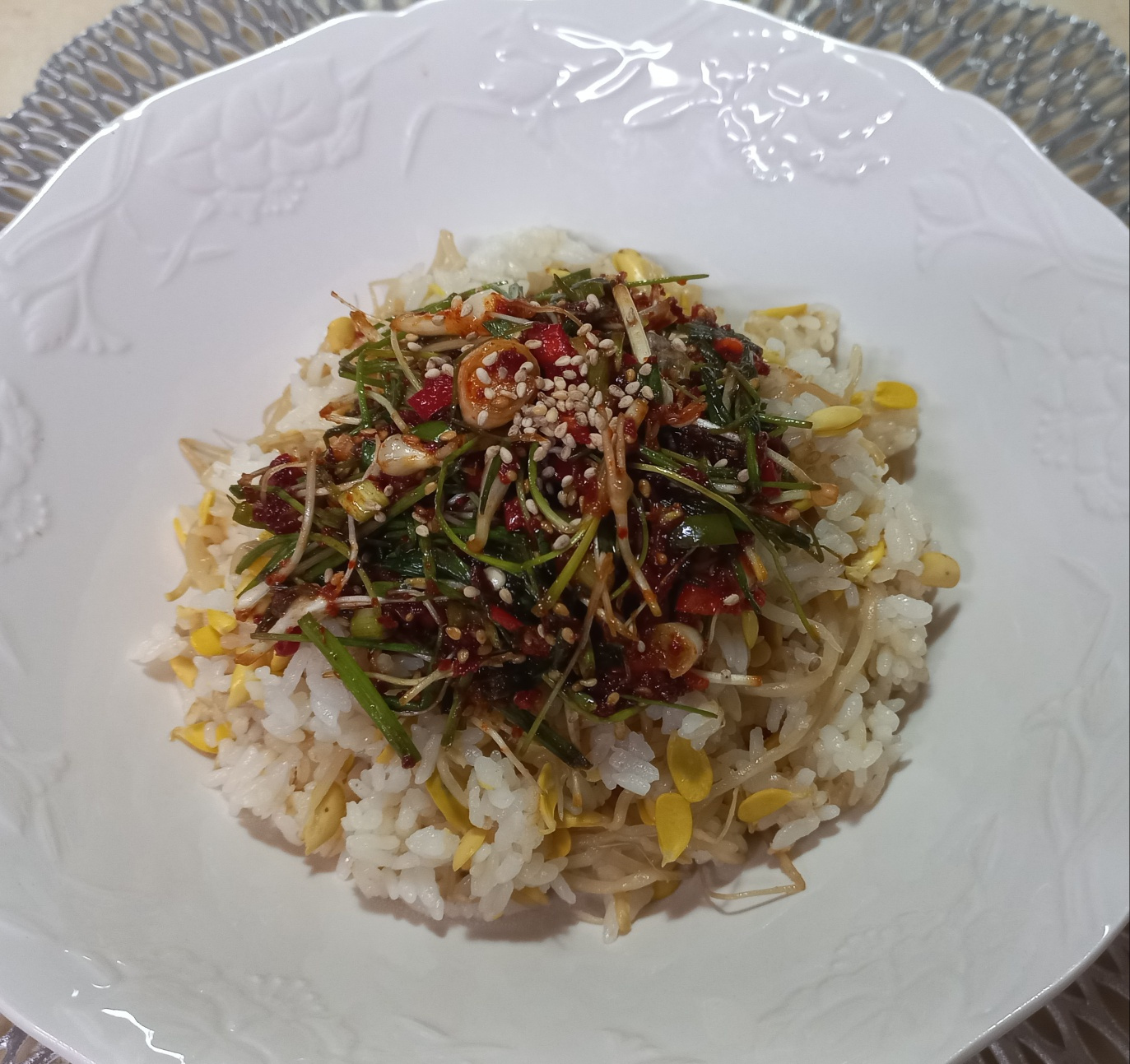Kongnamul-bap (Bean Sprout Rice) with Fragrant Dallaem Jang (Seasoning)
Spring’s Delight: A Delectable Recipe for Kongnamul-bap with Dallaem Jang

Experience the perfect harmony of savory bean sprout rice and a fragrant seasoning sauce, a dish you’ll crave again and again. This detailed recipe makes it easy for anyone to enjoy a wonderful meal at home.
Aromatic Dallaem Jang Ingredients- 50g Korean chives (Dallae) (Adds a fresh, spring aroma)
- 3 stalks of scallions (thinly sliced for fragrance)
- 1 Cheongyang chili pepper (add more if you like it spicy)
- 1 red chili pepper (for color)
- 2 Tbsp Gochugaru (Korean chili flakes)
- 1 Tbsp toasted sesame seeds (for nutty flavor)
- 4 Tbsp Soy Sauce (or Guk-ganjang, Korean soup soy sauce)
- 2 Tbsp Sesame Oil (for rich aroma)
- 1 Tbsp Maesil Cheong (plum extract) (for subtle sweetness)
- 1 Tbsp Oligodang (corn syrup) (for gloss and adjustable sweetness)
Savory Kongnamul-bap Ingredients- 300g Fresh Bean Sprouts (adds texture to the rice)
- 2 cups Rice (uncooked)
- 300g Fresh Bean Sprouts (adds texture to the rice)
- 2 cups Rice (uncooked)
Cooking Instructions
Step 1
First, prepare the star of the dish: the bean sprouts. Gently rinse the bean sprouts under running water two to three times. It’s important to wash them thoroughly to remove any dirt or debris. After washing, place them in a colander and let them drain completely. Ensure all excess water is removed, as any remaining moisture can make the rice mushy.

Step 2
Next, wash the rice. Instead of scrubbing vigorously, rinse the rice gently 2-3 times until the water runs mostly clear. Place the washed rice in the rice cooker. Fill with water, but use slightly less water than you normally would for plain rice. This is because the bean sprouts will release moisture during cooking, and too much water can lead to soggy rice.

Step 3
Once the rice and water are in the cooker, evenly spread the prepared bean sprouts on top. Close the lid and select the ‘White Rice’ setting to cook the rice. Placing the bean sprouts on top helps preserve their crisp texture.

Step 4
While the rice is cooking, it’s time to make the fragrant Dallaem Jang. For the dallae (Korean chives), trim off any dark root ends or dirt. Soak them in cold water and gently rinse to clean them, similar to washing greens. Once clean, lightly pat them dry.

Step 5
Prepare the seasoning ingredients for the Dallaem Jang. In separate small bowls or a larger mixing bowl, get your soy sauce (or Guk-ganjang), gochugaru (chili flakes), toasted sesame seeds, plum extract, sesame oil, and oligodang ready.

Step 6
Chop the cleaned dallae into bite-sized pieces, about 2-3 cm long. Thinly slice the scallions to add a fresh aroma. For the chili peppers, remove the seeds and finely mince them. The Cheongyang chili adds spiciness, while the red chili adds color. Adjust the amount of chili peppers to your preference.

Step 7
Combine the chopped dallae, scallions, and chili peppers in a mixing bowl. Add the soy sauce, gochugaru, sesame seeds, plum extract, oligodang, and sesame oil. Ensure all the seasoning ingredients are ready to be mixed with the vegetables.

Step 8
Using a spoon, gently mix all the ingredients in the bowl until well combined. This allows the seasonings to coat the vegetables evenly, creating a delicious Dallaem Jang bursting with spring flavors. Taste and adjust seasoning if needed – add more soy sauce for saltiness or oligodang for sweetness.

Step 9
Once the kongnamul-bap is cooked, open the rice cooker and gently fluff the rice with a spatula. Be careful not to mash the rice grains. The goal is to evenly distribute the bean sprouts throughout the cooked rice.

Step 10
Serve the warm kongnamul-bap in a bowl. Generously spoon the freshly made Dallaem Jang over the top. This aromatic and flavorful dish is now ready to be enjoyed! Mix it all together or enjoy spoonfuls of rice with the seasoning for a truly satisfying meal.



